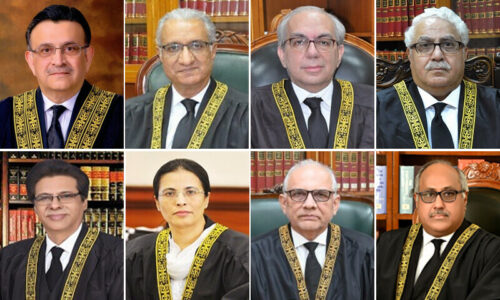ISLAMABAD -UNS: In a pre-emptive strike, the Supreme Court (SC) ruled on Thursday that after the bill aimed at clipping the powers of the chief justice of Pakistan (CJP) received either the president’s assent or it was deemed to have been given, the act that “comes into being shall not have, take or be given any effect nor be acted upon in any manner”.
An eight-judge SC bench issued the written order while hearing a set of three petitions challenging the Supreme Court (Practice and Procedure) Bill 2023.
The proposed law is aimed at depriving the office of the CJP of powers to take suo motu notice in an individual capacity.
It was initially passed by both houses of parliament and sent to the president for his assent. However, the president had sent it back, saying that the proposed law travelled “beyond the competence of parliament”.
On Monday, the bill was passed by a joint sitting of parliament with certain amendments, amid a noisy protest from PTI lawmakers.
As per the Constitution, the bill will be sent to the president once again for his assent, and if he does not sign it within ten days, assent will be deemed to have been granted.
However, with the SC’s latest order, the implementation of the law that will subsequently come into effect has been halted.
The detailed order issued said that contentions raised disclosed that there was a “substantial, immediate and direct interference with the independence of the judiciary in the form of multiple intrusions, in the guise of regulating the practice and procedure of this court and conferring upon it a jurisdiction that appears not to be permissible under any constitutional provision”.
“Such intermeddling in the functioning of the court, even on the most tentative assessment, will commence as soon as the bill becomes the act. Accordingly, in our view an interim measure ought to be put in place, in the nature of an anticipatory injunction.
“The making of such an injunction, to prevent imminent apprehended danger that is irreparable, is an appropriate remedy, recognised in our jurisprudence and other jurisdictions that follow the same legal principles and laws.
“It is therefore hereby directed and ordered as follows. The moment that the bill receives the assent of the president or (as the case may be) it is deemed that such assent has been given, then from that very moment onwards and till further orders, the act that comes into being shall not have, take or be given any effect nor be acted upon in any manner,” it said.
The detailed order said that while the bill is “not yet law it is nonetheless, with exactitude, that what will have the force of law, when the act comes into being,” adding that it could be considered and examined even at this stage.
“The bill prima facie seems to be open to question on the constitutional plane on several grounds which, inter alia, raise issues of a serious nature in relation to the independence of the judiciary. Such independence is deeply rooted in the fabric of the Constitution and forms an integral part of the structure of fundamental rights. Indeed, it is itself one such right. Any legislative effort that interferes with, or impinges on, the same should be subjected to close scrutiny,” the order said.
It further said that the bill, in clauses two to four, sought to regulate the manner in which appeals before the court were to be heard, in particular the benches that were to take up the cases and decide the same.
It went on to say that the bill appeared to be premised on the approach that Article 191 of the Constitution sets up a hierarchy in relation to the practice and procedure of the court.
Article 191 states the following: “Subject to the Constitution and law, the Supreme Court may make rules regulating the practice and procedure of the court.”
“On this view the Constitution is obviously at the top, followed by ‘law’ and then the rules made by the court itself. This hierarchical structure prima facie subordinates the rules made by the court to ‘law’ and therefore, the Supreme Court Rules, 1980 to the incoming act. The regulation of the matters laid out in clauses two to four purports to trump anything contained in the rules.”
The order said that clause eight of the bill sought to reinforce this by giving overriding effect for its provision over not only any rules but also any judgement of any court. “Prima facie, this approach is a serious encroachment upon, interference with and intrusion into the independence of the judiciary.”
The order further stated that any intrusion in the practice and the procedure of the SC, even on the most tentative of assessments, would appear to be “inimical to the independence of the judiciary, no matter how innocuous, benign or even desirable the regulation may facially appear to be”.
“Prima facie, therefore, when the bill and the act that is soon to come into being, is examined on the anvil of the most fundamental principles that underpin the Constitution, it can be regarded as seriously wanting in constitutional competence.”
The order said that clause five of the bill purported to confer a new appellate jurisdiction on the court in exercise of legislative power under Article 191.




